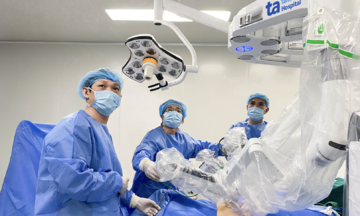Answer:
Gastroesophageal reflux disease (GERD), commonly known as acid reflux, is a prevalent digestive disorder. Symptoms include heartburn, belching, nausea or vomiting, upper abdominal pain, coughing, and hoarseness. Without timely treatment, GERD can lead to complications, including the development of esophageal adenocarcinoma, a common type of esophageal cancer.
Stomach acid refluxing into the esophagus irritates the esophageal lining. Bile can also reflux, causing a bitter taste in the mouth. Prolonged acid reflux damages esophageal tissue, potentially increasing the risk of esophageal cancer, although this is relatively rare.
The time it takes for GERD to progress to cancer depends on various factors such as symptom severity, age, lifestyle, diet, and others. It typically takes 10-20 years or longer for GERD to develop into Barrett's esophagus, a precancerous condition. However, the likelihood of Barrett's esophagus progressing to cancer is very low.
 |
Doctor Tri examines a patient. Photo: Tam Anh General Hospital |
Doctor Tri examines a patient. Photo: Tam Anh General Hospital
To prevent GERD from developing into cancer, regular checkups and adherence to prescribed treatment are essential. If medical treatment is ineffective, surgery might be considered. Surgical options include fundoplication (Nissen or Toupet), Linx surgery (magnetic ring), and transoral incisionless fundoplication (TIF).
While GERD can potentially lead to cancer, symptoms can be managed in the early stages to reduce the risk of complications. If you experience heartburn, belching, nausea, increased saliva production, or other unusual symptoms, seek medical attention promptly for diagnosis and treatment.
Dr. Nguyen Huu Tri
Department of Gastroenterology - Hepatology - Biliary - Pancreatic
Tam Anh General Hospital, TP HCM
| Readers can submit questions about digestive diseases here for doctors to answer. |












